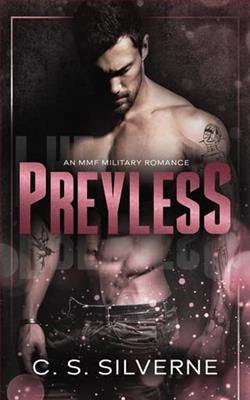Page 523 of Rosetti Family New York
"Dance with me," Van says suddenly.
There's no dance floor, just the terrace stones where I learned to roller skate as a child. The string quartet is taking a break. But Van pulls me against him anyway.
"You know what I realized?" he says against my hair.
"What?"
"You never needed my protection. You needed someone who could match you."
His hand finds the hidden collar through my scarf—the briefest touch that sends electricity through me.
"And you needed someone who could see past the surgeon to the man underneath," I reply.
"The broken soldier?"
"The protector who forgot he deserved protecting too."
We turn slowly on the terrace. Through the windows, I can see the dining room where we'll have Sunday dinners. The kitchen where Mama will teach me her sauce recipe. The garden where our children will play while their aunts and uncles argue about who gets to babysit.
Children who will grow up knowing that families can be complicated and messy and violent and still be worth choosing. Who will understand that love sometimes looks like a collarhidden under silk, like rope burns that heal into proof of survival, like a surgeon's hands learning to hold crystal without shattering it.
"I love you," Van says, and the words carry weight different from the first time. This isn't desperate or possessive or uncertain. This is recognition of something that has grown from debt to need to choice.
"I love you too," I reply, and mean it in ways I couldn't have imagined when I first ran to Chicago.
The future spreads before us like the view from the mansion terrace. Whatever brought us together—debt, duty, fate—has transformed into something neither expected but both deserve.
This is what happiness looks like: not the absence of darkness, but the choice to build light strong enough to shine through it. Not the place you start from, but the place you choose to return to. Not perfect people, but perfect love—the kind that makes you stronger, braver, more yourself than you ever knew you could be.
Home.
Epilogue - Dante
Six months later - Chicago
April
The spring rain hammers against the windows of my father's old study, but I prefer it to silence. Silence reminds me too much of myself.
Van and Carmela are visiting from New York, watching me pace—three steps, turn, three steps, turn. I can feel their concern like static in the air, see it in the way Carmela's hand rests protectively on her stomach, three months along now. They want to help. Everyone always wants to help the mute Rosetti.
They mean well, but they can't understand what it's like to have every thought filtered through a pen, every emotion reduced to what I can convey with my hands or my eyes. Ten years of silence has taught me that most people don't really want to know what I'm thinking anyway. They want the abbreviated version, the simple explanation that fits on a notepad.
The truth is always more complicated than what I can write.
"You're going to wear a hole in that carpet," Carmela says from the sofa. "Dante, talk to us. Or, you know, write to us."
The familiar joke doesn't land tonight. I stub out my cigarette harder than necessary and stare at the document that's been haunting me for three days. A twenty-year-old piece of paper that's about to upend everything Marco and I have built in Chicago.
Marco knows, of course. My older brother, the one who actually runs Chicago while I handle the tactical side. He laughed when I showed him—actually laughed. "At least she's beautiful," he'd said, like beauty matters when you're marrying someone who thinks you murdered their family.
I slide the contract across the desk to Van and Carmela, watching their faces change as they read. Shock, confusion, the dawning realization of what this means.
"A marriage contract? Dante, this is dated twenty years ago."
I pull out my notebook, the leather soft from constant use. Writing is faster than signing sometimes, especially for complex conversations. But even writing can't capture the full truth.
"I was fifteen."















